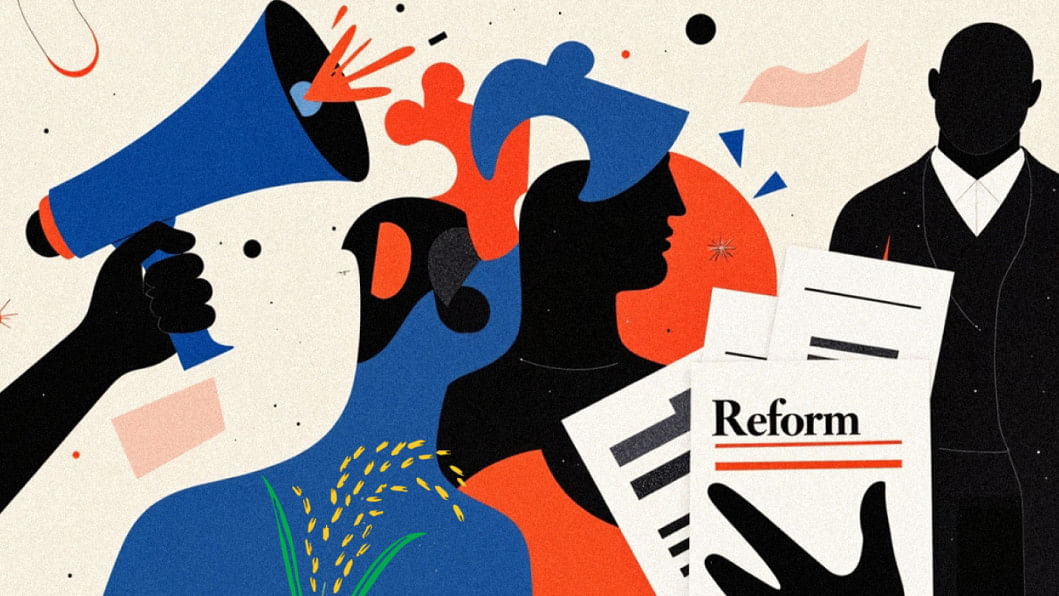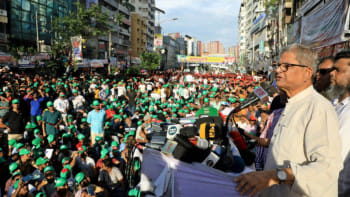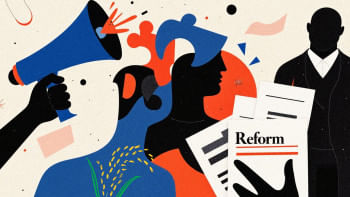What is missing in BNP’s reform agenda?

In the wake of the July 2024 uprising, Bangladesh entered a new political moment, one not just of rupture but of possibility. After years of democratic backsliding, centralised power, and disillusionment with electoral politics, the uprising gave rise to a widespread yearning for institutional reform and political accountability. In this context, the BNP brought its 31-point reform agenda to renewed focus, presenting it as its post-uprising vision. However, while the document signals a shift, it raises an important question: how deep does the commitment to reform go?
The 31-points are not without merit. In a political culture long dominated by winner-takes-all dynamics and centralised power, the BNP's willingness to publicly commit to electoral reforms, judicial independence, and decentralisation is noteworthy. For instance, proposals to restructure the Election Commission, ensure media freedom, and depoliticise the bureaucracy directly address demands that civil society has made for years.
However, it is equally important to ask what the document doesn't say, and why. While the agenda is reformist, its logic is largely reactive. Reform, in its truest sense, demands not just policy interventions but a fundamental rethinking of how political power is constituted, distributed, and held accountable. On that front, the agenda leaves some crucial gaps.
Reform as a moment or a mindset?
To begin with, politicians usually think of reform as a discrete set of deliverables rather than a shift in political culture. The BNP's agenda reads more like a checklist to roll back Awami League-era excesses than a forward-looking framework for inclusive, resilient governance. This framing reinforces the perception that the BNP is positioning reform as an oppositional strategy rather than a generative one.
For instance, decentralisation is one of the stated goals. But the agenda offers no specifics on how power and resources will be devolved to local governments. In a country where union parishads and municipalities are frequently undermined by patronage networks and underfunding, talk of decentralisation without a roadmap risk being symbolic rather than substantive. Will local bodies have independent budgets? Will they be insulated from partisan appointments? Will there be constitutional protections for local autonomy? These are the questions that a genuine reform agenda should answer.
Similarly, there is little reflection on the under-representation of marginalised groups within political parties themselves—youth, women, ethnic and religious minorities. In truth, the document emphasises normative ideals, such as neutrality of the Election Commission, but lacks functional clarity on implementation. For example, it asserts that the Election Commission must be "neutral", but how should it be made accountable to citizens beyond periodic elections? What institutional checks will ensure its neutrality in practice? Reform needs both normative intent and functional design.
What stands out, and why?
Crucially, the BNP's insistence on limiting executive power, including restoring the caretaker government system, has widespread public resonance. These are not just legalistic changes but reflect the public's demand. A few points deserve special mention for their political significance. The promise to repeal the Cyber Security Act and similar repressive laws is bold, particularly in a context where freedom of expression has become increasingly constrained. The call for judicial independence is also a recognition that the rule of law—not just regime change—is at the heart of democratic recovery.
But even here, the emphasis seems procedural. Perhaps an omission in the BNP's agenda is its silence on internal party reform. This is not a peripheral issue but goes to the heart of democratic credibility. Yet the document offers no commitment to institutionalise intra-party democracy. How are candidates nominated for elections? The BNP's failure to acknowledge its past complicity in eroding democratic institutions further undermines the sincerity of its reformist posture.
Missing the bigger picture
Bangladesh today is not just yearning for electoral reform but also grappling with deeper questions about the purpose of the state. What kind of economic model should underpin our democracy? How should foreign policy be reoriented to balance national interests in a multipolar world? What role should civil society and social movements play in shaping public policy?
None of these questions is meaningfully addressed in the 31-points. Apart from generic references to tackling corruption and ensuring fair distribution of resources, the agenda is silent on the broader economic direction. As Bangladesh confronts rising inequality, youth unemployment, inflation, and a precarious fiscal situation, any reform agenda must include an economic model that prioritises equity, resilience, and sustainability. For example, what will be the BNP's stance on labour rights? Will it prioritise industrial policy for job creation? Their silence on these questions suggests a narrow conception of governance, one focused on political restructuring but not economic transformation.
Reform is not just about domestic housekeeping. It is about situating the country within a shifting international order. In an increasingly complex geopolitical environment, with tensions between China and the US, growing regional competition, and shifts in global development finance, Bangladesh's foreign policy positioning is more crucial than ever. Yet the BNP agenda is silent on this front as well. What role does the party envision for Bangladesh in regional forums like BIMSTEC or SAARC? How will it manage economic and political relations with India and China? Will it continue to rely on remittance-dependent growth, or seek deeper South-South cooperation?
Reform must speak to people's aspirations
Reform must be lived, institutionalised, and owned. The BNP's emphasis on restoring the caretaker government system, revoking authoritarian laws, and depoliticising public institutions does resonate with widespread public grievances. Yet reform cannot be imposed from above or reduced to a technocratic exercise. It must be participatory, negotiated, and rooted in the lived experiences of citizens. The BNP should create mechanisms to consult civil society, grassroots movements, and local communities in shaping and implementing reforms. Without such a democratic platform, even the most well-intentioned reforms risk becoming elite bargains.
Reform is not a one-time pledge. It is a continuous practice. A reform agenda that emerges from a moment of political rupture imagines new relationships between the state and citizens, between institutions and political actors, and between the economy and justice. That requires a cultural shift as much as a policy shift.
Ultimately, the problem with the BNP's 31-point plan is that it is insufficient. This reform agenda is not a document but a language that requires a new grammar of politics—one that is inclusive and self-critical. But without a mechanism for implementation, such as a public oversight body, a timeline for legislative changes, or policy pilots, the agenda risks remaining aspirational rather than actionable. So, reform cannot be used only as slogans for election cycles.
If the BNP is serious about democratic transition, it must do more than promise change—it must model it. That means opening up its party structures, acknowledging past failures, and engaging the public in sustained dialogue. It also means treating citizens not just as voters, but as stakeholders in a shared democratic future. The same standards of scrutiny, transparency, and accountability must apply to all parties, whether in power or not. In that spirit, the BNP's agenda should be seen not as a finished product, but as an open invitation to debate, improve, and create a new democratic Bangladesh.
Aishwarya Sanjukta Roy Proma is a research associate at the BRAC Institute of Governance and Development.
Views expressed in this article are the author's own.
Follow The Daily Star Opinion on Facebook for the latest opinions, commentaries and analyses by experts and professionals. To contribute your article or letter to The Daily Star Opinion, see our guidelines for submission.


 For all latest news, follow The Daily Star's Google News channel.
For all latest news, follow The Daily Star's Google News channel. 









Comments